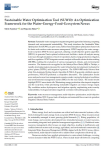Yaykiran S., Ekdal A. (2025). Sustainable Water Optimization Tool (SUWO): an optimization framework for the water–energy–food–ecosystem nexus. Water, 01/05/2025, vol. 17, n. 9, p. 1280.
https://doi.org/10.3390/w17091280
https://doi.org/10.3390/w17091280
| Titre : | Sustainable Water Optimization Tool (SUWO): an optimization framework for the water–energy–food–ecosystem nexus (2025) |
| Auteurs : | S. Yaykiran ; A. Ekdal |
| Type de document : | Article |
| Dans : | Water (vol. 17, n. 9, May 2025) |
| Article en page(s) : | p. 1280 |
| Langues : | Anglais |
| Langues du résumé : | Anglais |
| Catégories : |
Catégories principales 07 - ENVIRONNEMENT ; 7.3 - Eau. Gestion de l'EauThésaurus IAMM GESTION DES EAUX ; EAU ; ENERGIE ; ALIMENTATION HUMAINE ; ECOSYSTEME ; DURABILITE ; METHODE D'OPTIMISATION |
| Résumé : | Sustainable water management requires integrated approaches balancing competing demands and environmental sustainability. This study introduces the Sustainable Water Optimization Tool (SUWO), an open-source, Python-based simulation-optimization framework for basin-scale surface-water-resources management. SUWO employs the water-energy-food-ecosystem (WEF-E) nexus approach, utilizing a multi-objective genetic algorithm (MOGA) to generate Pareto-optimal solutions and facilitate a trade-off analysis among water uses through simulations of reservoir operations, hydro-energy production, irrigation, and flow regulation. SUWO integrates scenario analysis with multi-criteria decision making (MCDM), enabling the evaluation of various management, climate, and environmental scenarios. The framework was applied to the Sakarya River Basin (SRB) in Türkiye, a rapidly developing region pressured by water infrastructure development, hydroelectric power plants (HEPPs), and irrigation expansion. The SUWO-SRB model showed that while Non-dominated Sorting Genetic Algorithm II (NSGA-II) generally exhibited superior performance, NSGA-III presented a competitive alternative. The optimization results were analyzed across four management scenarios under varying hydrological conditions and environmental management classes (EMCs) for the near future. The model results highlight WEF-E nexus trade-offs. Maximizing energy production often impacts irrigation and the ecosystem, while prioritizing sustainable irrigation can reduce energy output. Dry conditions reduce hydropower and irrigation capacity, emphasizing water scarcity vulnerabilities. Ecological deviation negatively correlates with anthropogenic factors. |
| Cote : | En ligne |
| URL / DOI : | https://doi.org/10.3390/w17091280 |







